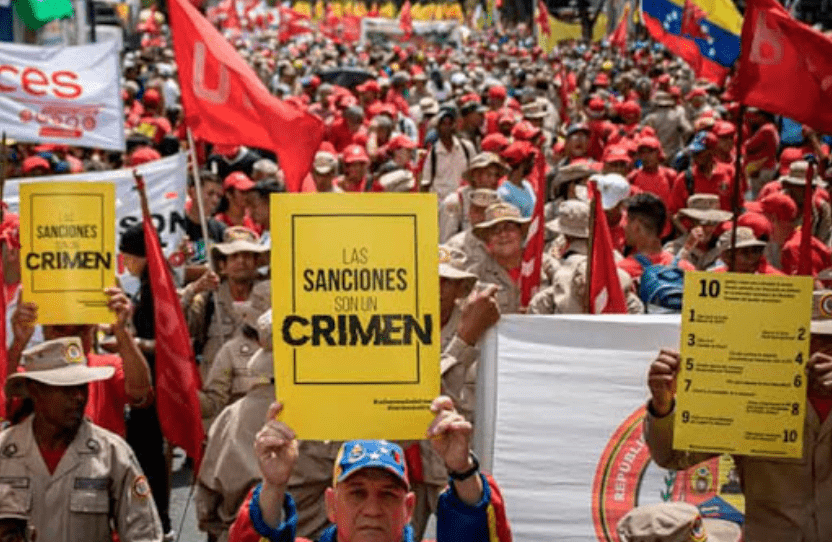By Tim Young, Venezuela Solidarity Campaign for Labour Briefing
The United States has moved again to tighten the screws on Venezuela as it advances towards the presidential election to be held on 28th July. President Biden has reimposed sanctions on Venezuela’s oil and gas industry that were temporarily lifted in October last year, following agreement signed in Barbados between the Maduro government and the US-backed right-wing opposition Unitary Platform which established certain conditions for the presidential election.
US sanctions have been levied against Venezuela for nearly a decade, in an attempt to bring about ‘regime change’ and replace an elected government with a compliant administration posing no challenge to US economic and political interests in the region.
The sanctions, which are illegal under international law, began by freezing Venezuelan assets abroad and cancelling visas for various Venezuelan officials.
Loss of confidence meant that foreign companies started pulling out, disrupting supplies of essential goods. Foreign banks became reluctant to handle transactions involving Venezuela. It became impossible to repatriate dividends from Citgo Petroleum, the US-based subsidiary of Venezuela’s oil company.
Secondary sanctions imposed by the USA on other countries, with penalties for any country daring to trade with Venezuela, increased the pressure. Under President Trump, the sanctions programme was ramped up into a blockade akin to that imposed against Cuba since the 1960s.
The toughest sanction measures targeted the state-owned oil company Petróleos de Venezuela (PDVSA) and its subsidiary CITGO, to disrupt Venezuela’s reliance on oil exports. The effect was to cut PDVSA off from international markets and block it from servicing debt. The damage to the oil industry has cost Venezuela $100 billion of revenue over the last five years.
As the blockade tightened, the impact on the lives of ordinary Venezuelans, particularly the poor, the sick and the elderly, became devastating, with far-reaching effects. In 2021, UN human rights rapporteur Alena Douhan concluded that “the sanctions and unilateral coercive measures applied by the United States and the European Union, as a deliberate tool to achieve regime change in Venezuela, flagrantly violate international law and all universal and regional human rights instruments.”
The war in Ukraine and the resulting global energy crisis forced the US to shift ground. Faced with experiencing substantial hikes in gasoline and diesel prices following its ban on Russian oil imports, in March 2022 President Biden approached the Maduro government with a view to buying oil, but with no intent to lift sanctions.
The October 2023 Barbados Agreement marked a change, with the US Treasury Department permitting production, investment and sale in the Venezuelan oil, gas and gold sectors under a six-month waiver.
But the US still warned corporations against investing in Venezuela, and threatened that the easing of sanctions could be reversed if in the US’s view conditions for a fair presidential election were not met by Maduro’s administration
Three months later, in January 2024, the US revoked the licence for Venezuela’s mining sector following Venezuela’s Supreme Court review ratifying María Corina Machado’s ban as a presidential candidate, despite a court review of disqualifications having been agreed by Maduro’s government and opposition party representatives.
Machado was first banned from running from public office after she served as the diplomatic representative for Panama in order to testify against her own country. Her other misdemeanours include being implicated in tax evasion, fraud and coup attempts, as well as her support for US-led coercive measures.
In April, the US revoked another licence to reimpose sanctions against Venezuela’s oil and gas industry, claiming that the Maduro government had not “fully met the commitments” of the Barbados Agreement.
Meanwhile, robbery of Venezuela’s stolen overseas assets continues. A US court has approved an auction of shares in the parent company of Citgo Petroleum, a US-based Venezuelan state corporation. Proceeds will pay businesses claiming compensation to the tune of $21bn for expropriations carried out by Chávez over a decade ago.
The US’s economic aggression and destabilisation attempts against Venezuela remain deep seated. Campaigning against US sanctions and the UK’s continuing support for this drive to undermine Venezuela’s national sovereignty remains a key priority for all parts of the solidarity movement here.
- With Keir Starmer looking increasingly likely to be the UK’s next Prime Minister, you can join the VSC in calling on the Labour Leader to ensure the Bank of England gives back Venezuela’s gold.

